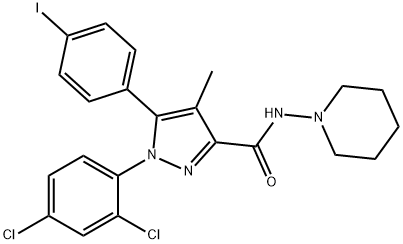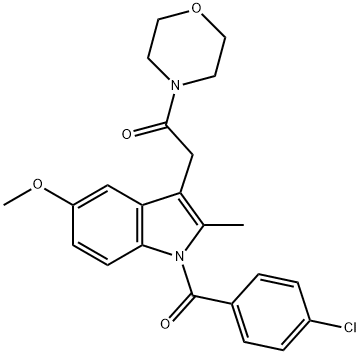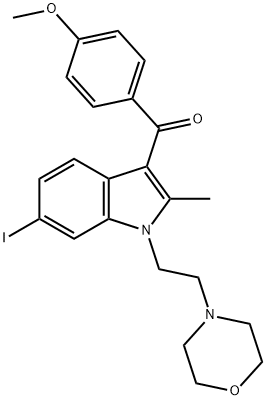ARACHIDONAMIDE
- CAS NO.:85146-53-8
- Empirical Formula: C20H33NO
- Molecular Weight: 303.48
- MDL number: MFCD00058606
- SAFETY DATA SHEET (SDS)
- Update Date: 2023-06-08 09:03:08

What is ARACHIDONAMIDE?
The Uses of ARACHIDONAMIDE
Arachidonamide (20:4, n-6) is a weak cannabinoid CB1 and CB2 agonist.
What are the applications of Application
Arachidonamide (20:4, n-6) is a weak cannabinoid CB1 and CB2 agonist
Definition
ChEBI: Arachidonoyl amine is a primary fatty amide resulting from the formal condensation of the carboxy group of arachidonic acid with ammonia. It has a role as a cannabinoid receptor agonist. It is functionally related to an arachidonic acid.
Biological Activity
arachidonoyl amide is a cb1 receptor agonist [1]. the cannabinoid receptor type 1, abbreviated as cb1, is a g protein-coupled cannabinoid receptor expressed primarily in the central and peripheral nervous system. cb1 receptor has been implicated in maintaining the homeostasis in health and disease. overexpression of cb1 receptor has been found in human hepatocellular carcinoma tumor samples and other human prostate cancer cells [2].arachidonoyl amide is an analog of anandamide (aea) that lacks the hydroxyethyl moiety. it was hydrolyzed by faah more effectively than aea but exhibited significantly weaker binding to the human cb1 receptor with a ki of 9.6 μm [1]. arachidonoyl amide exhibited similar binding and translocation into cells via the aea transporter compared to aea. arachidonoyl amide inhibited [3h]-aea uptake into human astrocytoma cells with an ic50 of 9 μm [3].
References
[1] felder c c, briley e m, axelrod j, et al. anandamide, an endogenous cannabimimetic eicosanoid, binds to the cloned human cannabinoid receptor and stimulates receptor-mediated signal transduction[j]. proceedings of the national academy of sciences, 1993, 90(16): 7656-7660.
[2] pertwee r g. the diverse cb1 and cb2 receptor pharmacology of three plant cannabinoids: δ9‐tetrahydrocannabinol, cannabidiol and δ9‐tetrahydrocannabivarin[j]. british journal of pharmacology, 2008, 153(2): 199-215.
[3] piomelli, d. ,beltramo, m.,glasnapp, s., et al. structural determinants for recognition and translocation by the anandamide transporter. proceedings of the national academy of sciences of the united states of america 96, 5802-5807 (1999).
Properties of ARACHIDONAMIDE
| Boiling point: | 462.9±34.0 °C(Predicted) |
| Density | 0.908±0.06 g/cm3(Predicted) |
| storage temp. | -20°C |
| solubility | ≤10mg/ml in ethanol;10mg/ml in DMSO;10mg/ml in dimethyl formamide |
| pka | 16.54±0.40(Predicted) |
| form | Colorless oil. |
Safety information for ARACHIDONAMIDE
Computed Descriptors for ARACHIDONAMIDE
New Products
Tert-butyl bis(2-chloroethyl)carbamate 4-Methylphenylacetic acid N-Boc-D-alaninol N-BOC-D/L-ALANINOL 3-Morpholino-1-(4-nitrophenyl)-5,6-dihydropyridin- 2(1H)-one Furan-2,5-Dicarboxylic Acid Tropic acid 1,1’-CARBONYLDIIMIDAZOLE DIETHYL AMINOMALONATE HYDROCHLORIDE R-2-BENZYLOXY PROPIONIC ACID 1,1’-CARBONYLDI (1,2-4 TRIAZOLE) N-METHYL INDAZOLE-3-CARBOXYLIC ACID (2-Hydroxyphenyl)acetonitrile 4-Bromopyrazole 5-BROMO-2CYANO PYRIDINE 5,6-Dimethoxyindanone 5-broMo-2-chloro-N-cyclopentylpyriMidin-4-aMine 2-(Cyanocyclohexyl)acetic acid 4-methoxy-3,5-dinitropyridine 2-aminopropyl benzoate hydrochloride 1-(4-(aminomethyl)benzyl)urea hydrochloride diethyl 2-(2-((tertbutoxycarbonyl)amino) ethyl)malonate tert-butyl 4- (ureidomethyl)benzylcarbamate Ethyl-2-chloro((4-methoxyphenyl)hydrazono)acetateRelated products of tetrahydrofuran



![5-(1,1-DIMETHYLHEPTYL)-2-[5-HYDROXY-2-(3-HYDROXYPROPYL)CYCLOHEXYL]PHENOL](https://img.chemicalbook.in/CAS/GIF/83002-04-4.gif)




You may like
-
 2033-24-1 98%View Details
2033-24-1 98%View Details
2033-24-1 -
 1975-50-4 98%View Details
1975-50-4 98%View Details
1975-50-4 -
 2-HYDROXY BENZYL ALCOHOL 98%View Details
2-HYDROXY BENZYL ALCOHOL 98%View Details
90-01-7 -
 2-Chloro-1,3-Bis(Dimethylamino)Trimethinium Hexafluorophosphate 221615-75-4 98%View Details
2-Chloro-1,3-Bis(Dimethylamino)Trimethinium Hexafluorophosphate 221615-75-4 98%View Details
221615-75-4 -
 61397-56-6 CIS BROMO BENZOATE 98%View Details
61397-56-6 CIS BROMO BENZOATE 98%View Details
61397-56-6 -
 14714-50-2 (2-Hydroxyphenyl)acetonitrile 98+View Details
14714-50-2 (2-Hydroxyphenyl)acetonitrile 98+View Details
14714-50-2 -
 118753-70-1 98+View Details
118753-70-1 98+View Details
118753-70-1 -
 733039-20-8 5-broMo-2-chloro-N-cyclopentylpyriMidin-4-aMine 98+View Details
733039-20-8 5-broMo-2-chloro-N-cyclopentylpyriMidin-4-aMine 98+View Details
733039-20-8